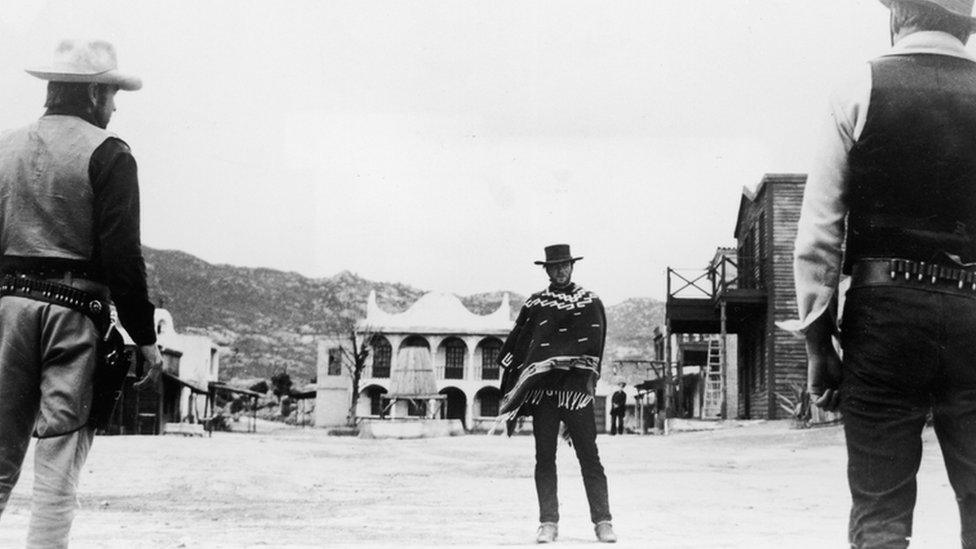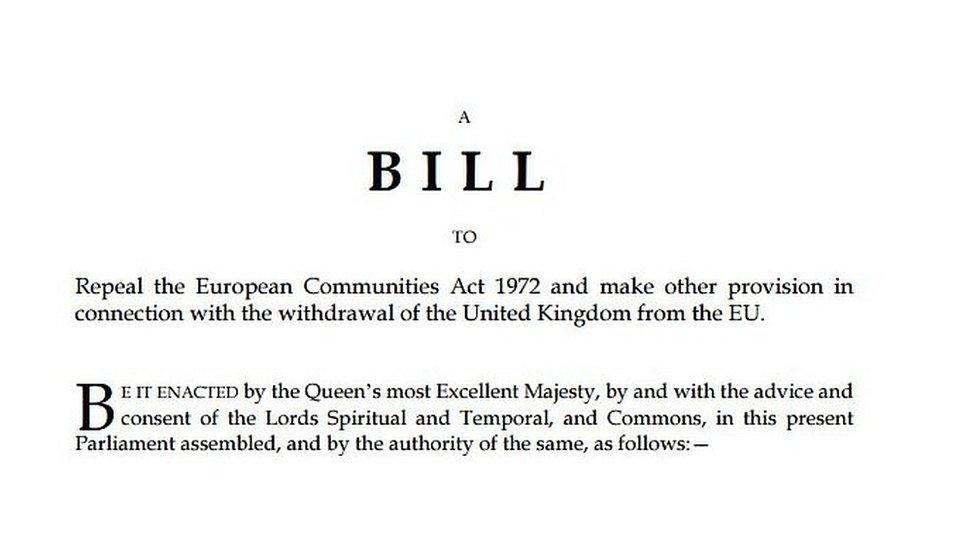Brexit bill: shootout or showdown?
- Published

Showdown in the Commons next week...but it's unlikely to involve ponchos
It's going to be a 12-hour Technicolor epic. The political stakes will be huge. And for most observers outside (and many inside) the Commons Chamber, it may be well-nigh incomprehensible.
The long-awaited Commons consideration of Lords Amendments to the EU (Withdrawal) Bill is already being billed as a kind of Brexit High Noon, with Brexiteers and Remainers picking their way toward each other through the parliamentary tumbleweed, cigars clenched in their jaws, ponchos flapping, for a confrontation directed by Sergio Leone, external or Sam Peckinpah, external.
But let's fade down the spaghetti western soundtrack; the outcome of next Tuesday's votes will be important for Brexit, but not decisive.
Further down the road lurks the promised Withdrawal and Implementation Bill,, external which will set the actual terms of Britain's withdrawal - and many issues may be kicked down the road till that arrives, perhaps in the autumn, or even after Christmas.
The actual shape of the shootout has yet to be determined.
We know that the debate will take place across 12 hours next Tuesday - in effect two parliamentary days compressed into one - but we don't yet know exactly how the government business managers propose to divide up the time into sections, or what attitude they will take to the various changes Their Lordships, in their wisdom, made to the bill.
And remember that there were 201 amendments to the bill in the Lords, external - many proposed by the government itself.
In particular there were the devolution amendments made to what was then Clause 11, which remain highly controversial with the SNP, in particular.
Lords defeats
Then there are the 15 amendments on which the government was defeated in the Lords. Some ministers might decide to take on the chin, and simply accept; some they might seek to amend, some they might offer alternatives to ("amendments in lieu" in parliamentary jargon) and some they might seek to simply remove.
It is possible that a batch of government amendments may emerge on Thursday, which will indicate their stance and any compromises then propose to offer to MPs (they might keep a few compromises up their ministerial sleeves to offer to peers, later on).
The Brexiteer camp, incidentally, will be watching this closely, for signs of what they fear may be unacceptable government concessions to Remainers. And equally important will be the timetable motion suggesting the proposed sections for that debate.
At the moment the rumour is that there will be three sections - each with a series of votes at the end. From that, it follows that a good 90 minutes of the 12 hours will be absorbed by votes. But we may not see that timetable until next week, and there are already murmurings that Labour will attempt to vote it down - a move which, if successful, could force the government to pull the whole debate
What amendments the government offers is extremely important in what will follow, because the rules for Commons debate of Lords amendments are eye-wateringly tight.
This is not like the report stage consideration of a bill, where the chair has considerable discretion over what gets voted on; the rules are clear - the vote is on whatever is being discussed when the section of debate ends (when the "knife" comes down, in Commons-speak) and on any motions moved by a minister.

And it is a simple matter for the government to ensure that only its amendments are being discussed when that moment comes; the whips would have to slip up for anything else to come under discussion at that critical moment. So while Opposition parties will put down motions, they have little chance of qualifying for a vote - although they may still have importance as a way of sending smoke signals to the Lords about Commons support for particular propositions.
So the votes on Tuesday will be on the government's response to the various changes made to the bill by peers - unless they so arrange things that someone else's amendment is considered. (And there is some Tory temptation to allow the Keir Starmer soft Brexit amendment to be voted on, in the expectation that it might produce a Labour split.)
Will the government have the votes to get its way?
The answer to that question varies from issue to issue - but much of the focus will be on the Customs Union amendment.
The actual words of this proposition are quite weak - they would require a minister to report to MPs by the end of October, on the steps taken to keep Britain in "a" customs union with the EU.
Could ministers fulfil that requirement by sauntering to the Dispatch Box and telling MPs (perhaps with their fingers crossed) "well, we tried…."
Or might they take the view that the amendment, if passed, would demonstrate a clear view in the Commons in favour of a customs union, undercutting current government policy? Labour have called for UK membership of a customs union, so the keystone of a potential anti-government majority in the Commons is in place.
But if the Commons is to vote to keep that amendment, a number of Conservatives have to defy their party and vote for it, all the smaller parties bar the DUP have to stack up behind it, and above all, the Labour whips have to muster their troops behind it, including the considerable number who represent strongly Leave constituencies.
Given this is official party policy, and that it would clearly cause the prime minister considerable discomfort, the Labour whips may well be able to do so.
That contrasts with another Lords amendment calling for membership of the European Economic Area, the EEA (the so-called "Norway Option"). This is emphatically not Labour policy (although Labour Remainers hope to nudge their party in that direction) and many of those Labour MPs in Leave seats will probably balk at endorsing an option which would keep the EU's free movement rules, after Brexit.
In fact, a lot of the action around this amendment seems to be more about internal Labour politics than the actual shape of Brexit.
Government loyalists are making confident noises about the impending debate, and Westminster doesn't have that frenetic atmosphere that normally descends in the build up to a very tight vote.
But I bet the Whatsapp groups will be humming this weekend.